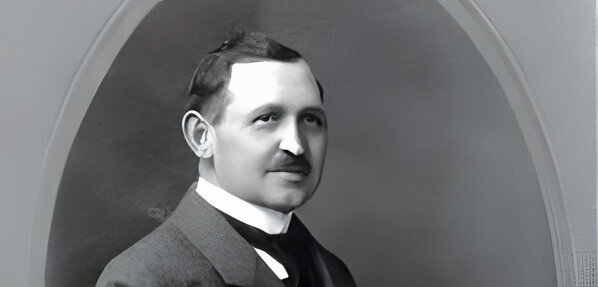All the signs point to success. The beginnings of the construction company.
It was 1900 and Leonhard Weiß had just completed his training as a civil engineer when he found work on a major construction site. A new railway line was being built in the Swabian Alb. The Härtsfeld Railway was to run from Aalen to Dillingen on the Danube. With shovels and pick-axes, the workers toiled through the sometimes impassable terrain. But as well as muscle power, technical expertise is also required. For example, when it comes to planning the route or solving unforeseen difficulties.
This is where Leonhard Weiß is in his element. On this site, he works as a surveyor, calculating height differences and curve radii. As a fireman he carries out controlled detonations and as a shaft foreman he coordinates and controls an entire construction team. He is able to draw on the wealth of experience he has gained on his father's building sites, with various employers and as a volunteer with the railway pioneers. The site management was more than satisfied and the Härtsfeld Railway became a turning point in Leonhard Weiß's life.
After a few months on the construction site, he was commissioned by the West German Railway Company in Stuttgart to extend the Härtsfeld line for the 10 kilometre stretch from Aalen-Neresheim-Ballmertshofen. He was responsible for all the 'earthworks, stonework, chausses and superstructure work'. With this major project, the then 20-year-old took the plunge into self-employment and from then on was a one-man operation.
When Leonhard Weiß left the Härtsfeld Railway at the end of 1901, his good reputation quickly brought him further contracts. His knowledge and experience were in demand not only in track construction, but also in other areas such as road and pipeline construction. People like him were needed in the age of industrialisation. Urban populations were exploding and roads, pipelines and sewers were being built everywhere.
Immediately after his time with the Härtsfeld Railway, Leonhard Weiss managed the construction of a by-pass road (now a main road) near Aalen, where he 'proved to be a capable, competent, reliable and efficient contractor in the sometimes difficult work'. A few years later, he was involved in the extension of the Pfauhausen railway station, where he built a jackdaw system and carried out all the earthworks and reinforcement work for the Royal Railway Inspectorate. In Oberesslingen, he was commissioned to carry out the excavation work for the new gas supply and later won the contract for the excavation, stone cutting and concreting work for the extension of the local water supply.
Leonhard Weiß soon became well known as a civil engineering contractor in Plochingen. However, after his marriage to Ottilie Streicher in 1908, he became increasingly active in Göppingen. His first office was in a shared flat above a pharmacy in Karlstrasse, and he was on good terms with the town council. In 1913 he carried out, among other things, the 'sewerage work necessary for the extension of the local telephone network'. When the cemetery was enlarged, his company carried out some of the earthworks and levelling.
A good reputation, a first company headquarters, full order books - all the signs pointed to success. But then came 1914 and the turning point of the First World War. Leonhard Weiss left his company and his family. When he returned, the signs of growth were no longer there, as the debt-ridden country was heading for a severe economic crisis.
